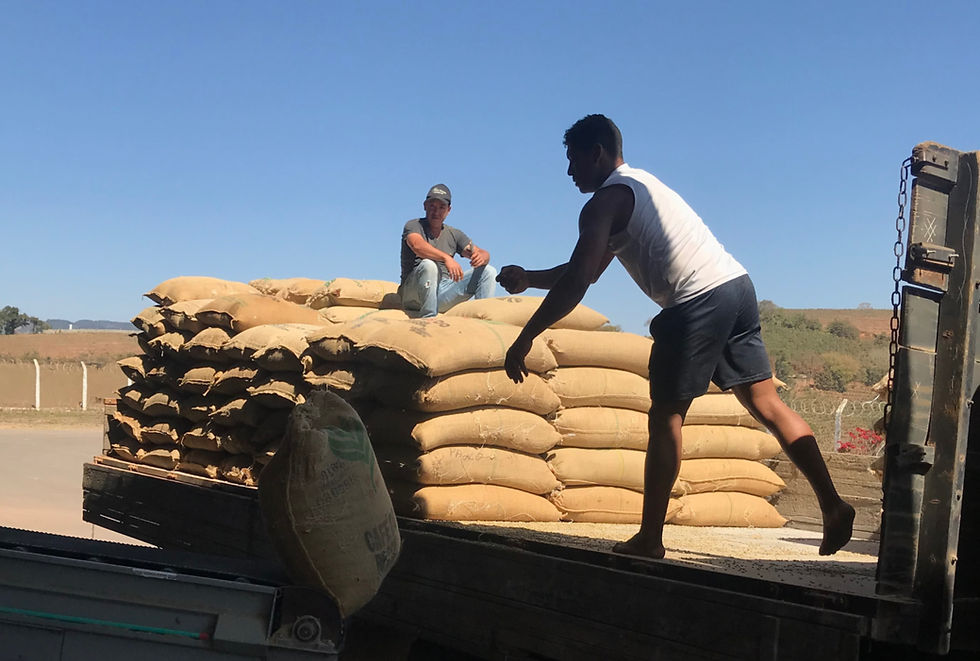Fine Robusta from Peru.
- Info ekô
- Feb 19, 2025
- 4 min read
Updated: Feb 24, 2025

The long journey comes to an end
For the eKô collective, it was always clear that we wanted to have a strong espresso on offer. An espresso with a lot of Robusta coffee in the blend, a lot of body and little acidity. Like all eKô coffees, it should be 100% organic, 100% Fairtrade and 100% speciality coffee.

But it wasn't so easy to find a high-quality Robusta coffee - especially if it also had to be certified organic and Fairtrade. After several years of searching, we found what we were looking for in central Peru, more precisely in the district of Villa Rica. The region lies between the Andes and the Amazon rainforest. Diego and Lukas discovered the Cepro Yanesha cooperative while travelling through Peru in 2023.
Cooperative Cepro Yanesha
We are used to visiting several cooperatives and regions when travelling to coffee-growing countries.This gives us a differentiated picture of the growing regions and the producers.
The managing director Gino Marin and his team impressed us in many ways with their quality awareness.For example, the cooperative promotes the cultivation of Robusta (coffee type) or Geisha (Arabica variety), which are rarely cultivated according to organic guidelines.
A great deal is invested in post-harvest processes and fermentation options are tested. The high-quality coffees are served by the cooperative in its own café in Villa Rica and sold under its own brand in Peru. We were impressed by this commitment from the field to the cup of coffee.
With around 130 producer families, the cooperative is relatively small and the infrastructure is rather modest. While we saw impressive buildings and large laboratories at other cooperatives, everything at Cepro Yanesha's headquarters took place in a very small space. It felt like being in a house.
However, these positive aspects should not obscure the fact that further efforts will be needed in the coming years to strengthen this cooperation. There is a need for constant trust building, solutions in logistics and financing.


Cooperation with the Yaneshas
Many people who belong to the indigenous Yaneshas group live in the cultivation area. Time and again, we experience the deep connection between the indigenous population and nature. Coffee is often grown in agroforestry systems and in harmony with nature. It goes almost without saying that no pesticides are used. We consider this to be an immense advantage because much less persuasion is required to implement the organic guidelines. This leaves more time to focus on quality.


Fine Robusta
Diego submitted samples of this Robusta coffee to an anonymised tasting and evaluation process in Switzerland. Three Robusta Q-Graders evaluated the coffee independently of each other. If the coffee fulfils the Specialty Coffee Grade requirements, we can call it Fine Robusta. The flavour or appearance of the beans is assessed. The fewer defects the coffee has and the better it tastes, the better it is rated.
Cepro Yanesha started growing this Robusta from 5 clones 30 years ago. Incidentally, the Robusta is a Coffea Canephora and not a Conilon, as is often found in Brazil.
We think this Robusta coffee is a promise for the future. Compared to Arabica coffee, Robusta is significantly more resistant to heat, disease and drought. It has a high-quality flavour of dark chocolate and almonds. Nevertheless, it fulfils all the requirements of a classic Robusta and gives the coffee blend its strong body and long aftertaste.
In addition to the 35% washed Fine Robusta from Cepro Yanesha, we use 65% washed Arabica coffee from the Union of Ejidos and Communities San Fernando cooperative (Tenejapa Community Blend).

Roasting
None of our coffee blends has challenged us more than the Espresso Forte.
We start with a very brief and very simplified excursus on roasting. As the roasting time increases, the body and flavours develop. At the same time, the acidity decreases. Typical Italian coffees are roasted for a long time and therefore have a lot of body and little acidity. The flavour is often dominated by strong roasted notes.
And this was precisely our biggest challenge when roasting the eKô Espresso Forte. We wanted the quality of the two high-quality coffees in the blend to come into its own and not be drowned out by roasted flavours. Nevertheless, the coffee should have as little acidity as possible.
To this end, we first carried out test roasts on a 1-kilogram sampler roaster and determined the mixing ratio between the Robusta and Arabica coffees. In a second step, 10 kilograms of the coffee blend were produced on a medium-sized Probat roaster. We tested this blend collectively, but were not satisfied with the overall balance, flavour profile and excessive acidity. We carried out another test roast with a longer roasting time and gave this blend to two test groups for tasting. After the positive feedback and also our conviction that this will be a great Espresso Forte, we carried out the first roast on the 250KG roaster with the last small adjustments.

Conclusion
This Fine Robusta fits perfectly into the eKô coffee blends. This coffee also achieves what we want to show with the entire brand: sustainable organic coffee in speciality coffee quality.
COOPERATIVA AGRARIA CAFETALERA CEPRO YANESHA
Number of members | approx.. 130
Ø coffee acerage per producer | 2-4ha
Altitude of cultivation area | 800-900 Region | Villa Rica, Zone: San Pedro de Pichanaz
Certifications | EU Bio, Bio Suisse, Fairtrade
Process | Washed
Sustainability projects |
Production of organic fertiliser. Honey production for income diversification. Collaboration in the conservation of the Oxapampa-Ashaninka-Yanesha (BIOAY)
Travel report | September 2023
Use of the coffee at eKô: Espresso Forte



Comments